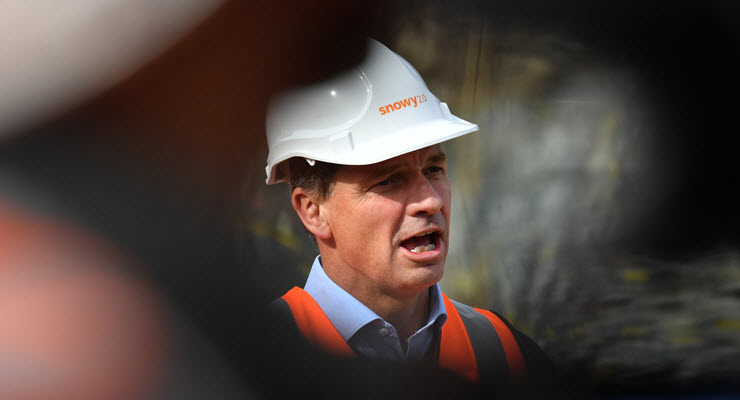
The evidence is in: gas won’t pull Australia out of a recession.
Former prime minister Malcolm Turnbull has already called the government’s gas-led recovery “BS” and “political piffle.”
Now two reports raise even more questions about the claims being made about Scott Morrison’s gas-led recovery, particularly the ability for gas to create manufacturing jobs.
A report by the Grattan Institute reveals that, far from creating a much needed economic stimulus, gas will decline as an energy source for homes and industries in Australia.
And another report by The Australia Institute reveals a gas-fired recovery will not assist Australia’s manufacturing industry, with the biggest benefits going to companies that export gas, not local manufacturers.
The Coalition has previously sided with the work of the Grattan Institute in areas such as education.
So why is the government pushing a gas-led recovery? And who benefits?
Gas was elevated to the centre of the government’s energy strategy earlier this year with Angus Taylor’s proposed “technology roadmap” retaining and expanding the role of fossil fuels in the economy.
At the same time, it became front and centre of the government’s COVID-19 recovery plan, with the appointment of senior oil and gas executives to the National COVID-19 Commission (NCC).
As Crikey has pointed out, the NCC is stacked with energy industry heavyweights. The group is led by former Fortescue boss and Strike Energy director Nev Power and receives advice from former Dow Chemical boss Andrew Liveris, who also sits on the board of Saudi Aramco.
Liveris was behind a leaked draft report by the NCC’s manufacturing taskforce that advised the government that between 37,000 and 69,000 new direct jobs could be created in manufacturing by lowering gas prices.
But the Grattan report found this advice was based “more on wishful thinking than careful analysis”.
Grattan Institute energy program boss and author of the report Tony Wood said the government’s gas-led recovery appeared to be driven by politics more than economic analysis, in particular the agenda of the NCC.
“When you think about that part of the commission, it was appointed to provide direct advice to the prime minister on an economic recovery,” he said. “In this case it played to something Morrison was already looking for.”
“There is no doubt that a government of any political persuasion will always be attuned to what major corporations with significant financial investment are saying.”
The gas industry has deep political connections in Australia beyond the NCC. Senior adviser to Scott Morrison, Yaron Finkelstein, worked for Crosby Textor when it was an adviser to gas lobby group the Australian Petroleum Production and Exploration Association (APPEA). The Coalition’s pivot to gas is the same strategy being pushed by APPEA in 2011, and positions gas as the bridge from coal to renewables.
Australia Institute climate and energy program director Richie Merzian said the government’s gas-led recovery was little more than a successful “lobbying and marketing” campaign.
“There’s probably just as many gas jobs in the ACT as WA. It is very powerful behind-the-scenes work,” he told Crikey.
Then there are the donors. Crikey has already written extensively about how the prime minister’s energy policy is built around the interests of the government’s biggest fossil fuel donors — Santos, Origin, Woodside — under the guise that gas is a “transition fuel” to be added to the mix alongside renewables.
This also plays to a political argument that gas, like coal, appeals to the Coalition’s base.
“Their favourite fossil fuel has become political poison,” Merzian said. “This is their next fossil fuel of choice. And it comes with better marketing — imagine if we could call coal natural coal.”








Geez I’d love to test the strength of that idiotic hard hat Taylor is wearing.
“In this case it played to something Morrison was already looking for.”
Bang-on Mr Wood. The NCC, full of gas people and their gas, was hand-picked for the very purpose. The ‘gas-led recovery’ was planned in the form of the ‘gas-mates bonanza’, quite probably even before the pandemic arrived; the pandemic just provided the excuse.
The NCC ..Australia’s executive cabinet of government ?..Yes i know we still have a sitting sometimes at times parliament, but we don’t even need its permission or not, to go to war…
Please can we have some more analysis of the companies that make up the gas industry, the location and size of their activities (production and exploration) their share price/accounts history. Ditto with the gas-intensive manufacturing industries where the jobs are going to be created.
PB, try yesterday’s Guardian article by Adam Morton “Benefits of coalition’s ‘gas – led’ recovery overstated … “.
Who’d have thought that a policy designed by the fossil fuel industry will benefit …the fossil fuel industry.
The transition fuel would provide a comfortable old age for our contemporaries, and a transition into hell for our descendants.